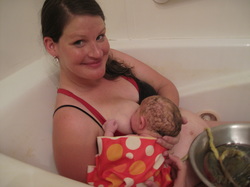Birth Doulas are becoming more and more prevalent in our country, so I think it's a good time to discuss what a birth doula actually does. When I talk with people about my job, there seem to be a lot of misconceptions about what a doula does and who should hire one! I think it's only fitting that my first blog post talk about a few of these misconceptions and set the record straight.
1. Doulas will advocate for me.
It seems to be a common belief that a doula will stand up for you during your birth should a doctor or nurse suggest/perform something that is not on your birth plan. Doulas do not do this. It is actually outside of the scope of practice for most of the organizations who train and certify doulas. As doulas, we are not supposed to communicate on your behalf to your care providers.
So what does a doula do then?
When you are pregnant, a doula encourages you to research all of your options and give you information to read and study. They discuss this information with you and answer any questions. They encourage you to speak to your care provider about your research and preferences so that you and your birth team are on the same page. A doula also help you craft a birth plan tailored to your families' needs. You will be encouraged to also discuss this with your care provider. By the time you are in labor, everyone should know what your preferences are. Copies of birth plans should be handed to every new nurse and doctor so they know what you want and what you do not want. Most important, by the time you are in labor you should be educated enough to make informed decisions about your birth and voice concerns to your provider.
During your birth, if a doctor or nurse begins to suggest things not on your birth plan for whatever reason, a doula will often ask if you would like a moment alone to discuss this with your partner. They encourage you to do this so you can discuss the risks-versus-benefits and options available. During that time a doula will provide information and support for whatever option you and your partner choose.
In short, A doula is there for you to support you in whatever decisions your family makes during your birth. They will do their best to ensure you are prepared to make informed decisions for yourself and your baby. I always tell clients my most empowering birth was the one where I had to make difficult decisions for myself and my baby. I was able to make conscious and informed decisions knowing that every choice I made was the right one. I strive to make sure all of clients are in the same position.
2. Doulas help women achieve a natural birth.
This particular misconception happens on both the client and doula side, and it's this misconception that bothers me the most. It is generally agreed that if you want to have a natural birth, you should hire a doula to help you achieve this goal. We are not able to ensure a natural birth, and even if we could not every woman will have one. What about those women?
When I had an emergency c-section at 35 weeks pregnant, I needed a lot of support. I needed help figuring out how to pump exclusively. I needed help processing what had happened to me and my daughter. I needed help bonding with my daughter because I had barely seen or touched her. I needed help with my recovery. I say all this to illustrate that it does not matter how a woman is planning to give birth (natural, medicated, hospital, home birth, vaginal, c-section), these women are giving birth too. You still have to work very hard and make many decisions at the drop of a hat when you're unable to think clearly. A doula is there to help you cope with the difficult stages of labor and to provide any information you need in order to make informed decisions. You still have to recover from and process your birth. A doula is there to listen to you and help you process all the feelings you have about your birth and recovery, whether they be positive or negative. You still have to feed your baby. A doula is there to help you feed your baby and answer any questions regardless of whether you're breastfeeding or bottle feeding. A doula is a support system dedicated solely to you. Women need that in birth regardless of what setting they are in.
3. Doulas deliver babies.
I've been shocked to learn that even my mother thought some doulas deliver babies. No doula is licensed or qualified to deliver a baby. If your doula is training as or is a trained midwife or nurse, they may have necessary training, but as a doula they would be operating outside of their scope of practice if they delivered your baby. In the event of an emergency (not making it to the hospital in time) your doula should always call 911 while your husband follows instructions of the dispatch.
1. Doulas will advocate for me.
It seems to be a common belief that a doula will stand up for you during your birth should a doctor or nurse suggest/perform something that is not on your birth plan. Doulas do not do this. It is actually outside of the scope of practice for most of the organizations who train and certify doulas. As doulas, we are not supposed to communicate on your behalf to your care providers.
So what does a doula do then?
When you are pregnant, a doula encourages you to research all of your options and give you information to read and study. They discuss this information with you and answer any questions. They encourage you to speak to your care provider about your research and preferences so that you and your birth team are on the same page. A doula also help you craft a birth plan tailored to your families' needs. You will be encouraged to also discuss this with your care provider. By the time you are in labor, everyone should know what your preferences are. Copies of birth plans should be handed to every new nurse and doctor so they know what you want and what you do not want. Most important, by the time you are in labor you should be educated enough to make informed decisions about your birth and voice concerns to your provider.
During your birth, if a doctor or nurse begins to suggest things not on your birth plan for whatever reason, a doula will often ask if you would like a moment alone to discuss this with your partner. They encourage you to do this so you can discuss the risks-versus-benefits and options available. During that time a doula will provide information and support for whatever option you and your partner choose.
In short, A doula is there for you to support you in whatever decisions your family makes during your birth. They will do their best to ensure you are prepared to make informed decisions for yourself and your baby. I always tell clients my most empowering birth was the one where I had to make difficult decisions for myself and my baby. I was able to make conscious and informed decisions knowing that every choice I made was the right one. I strive to make sure all of clients are in the same position.
2. Doulas help women achieve a natural birth.
This particular misconception happens on both the client and doula side, and it's this misconception that bothers me the most. It is generally agreed that if you want to have a natural birth, you should hire a doula to help you achieve this goal. We are not able to ensure a natural birth, and even if we could not every woman will have one. What about those women?
When I had an emergency c-section at 35 weeks pregnant, I needed a lot of support. I needed help figuring out how to pump exclusively. I needed help processing what had happened to me and my daughter. I needed help bonding with my daughter because I had barely seen or touched her. I needed help with my recovery. I say all this to illustrate that it does not matter how a woman is planning to give birth (natural, medicated, hospital, home birth, vaginal, c-section), these women are giving birth too. You still have to work very hard and make many decisions at the drop of a hat when you're unable to think clearly. A doula is there to help you cope with the difficult stages of labor and to provide any information you need in order to make informed decisions. You still have to recover from and process your birth. A doula is there to listen to you and help you process all the feelings you have about your birth and recovery, whether they be positive or negative. You still have to feed your baby. A doula is there to help you feed your baby and answer any questions regardless of whether you're breastfeeding or bottle feeding. A doula is a support system dedicated solely to you. Women need that in birth regardless of what setting they are in.
3. Doulas deliver babies.
I've been shocked to learn that even my mother thought some doulas deliver babies. No doula is licensed or qualified to deliver a baby. If your doula is training as or is a trained midwife or nurse, they may have necessary training, but as a doula they would be operating outside of their scope of practice if they delivered your baby. In the event of an emergency (not making it to the hospital in time) your doula should always call 911 while your husband follows instructions of the dispatch.


 RSS Feed
RSS Feed
